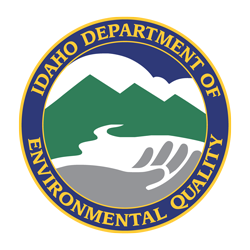Teaching about the environment can be fun for both educators and students. We developed lesson plans for various grade levels on a wide range of air quality, water quality, and waste management topics to assist teachers in providing environmental education.
Our staff are also available to conduct outreach events upon request.
- Energy Conservation Tips for Schools (Fact Sheet)
- Hey, We Need That! (Lesson Plan: K – 5th grades)
Students learn that we need sunlight and clean air, water, and land to live and observe what happens when plants don’t have these necessities. - Playing Hide and Seek…With Pollution! (Lesson Plan: Pre-K – 3rd grades)
Students explore the concept of pollution through an activity and a coloring sheet. - Pollution Prevention (P2) Bingo (Lesson Plan: 3rd – 12th grades)
Play “Bingo!” to reinforce good environmental practices. Good to supplement other activities.
- lClean Air Zone: Putting it to the Test (Lesson Plan: 7th – 12th grades)
Students bring the anti-idling Clean Air Zone program into schools and study its effects. - Earth Cleaning: Dusting the Air (Lesson Plan: 4th – 8th grades)
Students make “dust catchers” to collect particulate pollution around their school. - Inversion in a Cup (Lesson Plan: 4th – 8th grades)
Students create a temperature inversion and observe how cold air becomes trapped and how pollutants can become trapped with that cold air. - Smoke Detectives (Lesson Plan: 4th – 7th grades)
Students observe air quality conditions in their town to investigate the link between air quality and wood smoke. - When a Car Coughs…Taking a Close Look at Vehicle Exhaust (Lesson Plan: 7th – 9th grades)
Students capture particulate pollution from vehicle exhaust and compare results among vehicles.
- Incredible, Edible Aquifer | YouTube Video (Lesson Plan: 4th – 8th grades)
Students build edible aquifers and learn about aquifers and groundwater. - Pollution and Healthy Environment: Like Oil and Water (Lesson Plan: 4th – 8th grades)
Students pollute water to learn how pollutants mix with water in the environment. - The Rain Takes Pollution Mainly Down the Drain (Lesson Plan: 4th – 7th grades)
Students build storm water “mazes” and observe how storm water transports pollution from our streets to groundwater and surface water. - Source Water Discovery (Lesson Plan: 8th – 12th grades)
Students learn about source water and related concepts by using DEQ’s Source Water Assessment Online tool. - Where’s Your Watershed? (Lesson Plan: 4th – 7th grades)
Students explore local watersheds using maps and create their own watersheds to learn how they function. - Rathdrum Prairie Aquifer
DEQ’s Coeur d’Alene Regional Office (CRO) provides groundwater education and outreach as part of the RPA Protection Program and in collaboration with the Panhandle Health District, Kootenai County Aquifer Protection District, and The Confluence Project. - Lewiston-Clarkston Aquifer
Using the interactive educational features of the atlas, tour the aquifer, calculate your water footprint, print out worksheets for active learning experiences, and watch videos on ancient floods and groundwater.
- Conduct a Mercury Audit in Your School (Lesson Plan: 8th – 12th grades)
Students conduct an audit to determine what mercury-containing items exist in their school. - Doing the “Three R” Wrap (Lesson Plan: 4th – 7th grades)
Students wrap gifts and learn how to eliminate, reduce, reuse, and recycle waste. - Making a Mini-Landfill (Lesson Plan: 4th – 7th grades)
Students build landfills, learn about environmental issues surrounding landfills, and discuss actions they can take to keep waste out of landfills. - Pollution Prevention in the Laboratory (Fact Sheet)
- Recycling Relay (Lesson Plan: Pre-K – 3rd grades)
Students learn about trash and landfills, and how to reuse and recycle to produce less trash. - Something Old, Something New, Something Borrowed, Something Reused? (Lesson Plan: 4th – 12th grades)
Through interviews with older Americans and/or individuals from different cultural backgrounds, students gain an understanding of how the concepts of reduce, reuse, and recycle are neither new nor specific to American culture.

